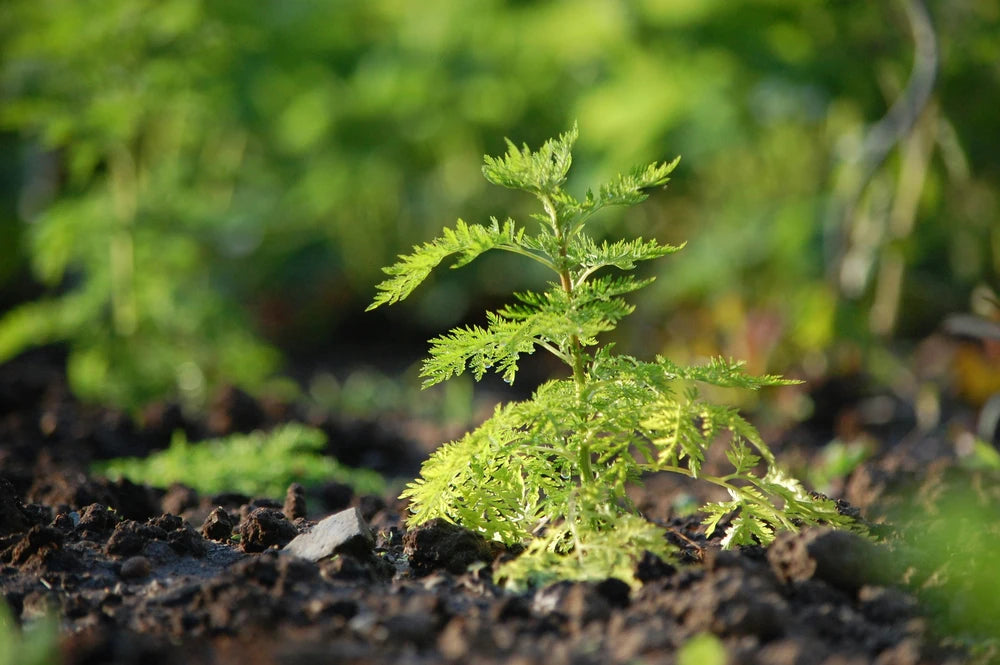Artemisia annua, a medicinal plant, is known for its healing properties. It is one of the main ingredients in our health elixir . Read all about Artemisia annua and why we use it in our product:
Artemisia annua, commonly known as sweet wormwood, sweet annie or qinghao, is a medicinal plant belonging to the Asteraceae family. It is native to Asia, particularly China, and is now cultivated in various parts of the world for its valuable medicinal properties.
The plant can grow up to 2 meters tall and is characterized by fern-like leaves and yellow flower heads.

Various types of herbal medicine are made from the stems, leaves and flowers. For example, Artemisia annua tinctures, topical ointments and teas.
Artemisia annua effect
Artemisia annua has been used as a medicinal remedy in traditional Chinese medicine for more than 2,000 years and is mainly used to treat fever and infections.
The active ingredient artemisinin was isolated in 1972 by the Chinese scientist Tu Youyou, who later received the Nobel Prize for her work.
Since then, artemisinin has been the subject of intensive scientific research and testing. It has shown positive effects, particularly in the treatment of malaria.
Artemisinin is effective in reducing the parasite burden in malaria patients, especially Plasmodium falciparum, the most dangerous malaria parasite.
In addition to artemisinin, Artemisia annua has an interesting nutritional profile with amino acids, vitamins and minerals as well as other elements important for health.
Artemisia annua is also traditionally used to treat digestive problems such as loss of appetite, stomach pain and flatulence.
The plant’s bitter substances stimulate the appetite and digestion, relieve gastrointestinal complaints and support a healthy intestinal microbiota.
In addition to malaria and digestive problems, Artemisia annua is also being researched for its potential antiviral, anti-inflammatory and anti-cancer properties.
Benefits of Artemisia annua
1. Antiviral
Research shows that Artemisia annua has antiviral properties. Artemesia annua may therefore be effective in treating viral infections.
Studies have shown that extracts from the plant can inhibit the proliferation of various viruses, including hepatitis B and C viruses.
2. Anti-inflammatory
Artemisia annua has anti-inflammatory properties and is therefore useful in the treatment of inflammatory conditions.
The plant's extracts can modulate the immune system and thus potentially help in the treatment of autoimmune diseases and relieve inflammation-related symptoms.
One study suggests that Artemisia annua is helpful in treating osteoarthritis due to its anti-inflammatory effects. This is especially true for osteoarthritis in the knees and hips. It helps with pain and stiffness.
3. Anticancer
Studies suggest that artemisinin has anti-cancer properties. It can induce apoptosis (programmed cell death) in cancer cells and inhibit their proliferation.
Artemisinin has shown promise in laboratory studies against several types of cancer, including leukemia, breast cancer and prostate cancer.
Artemisia annua is a medicinal plant with a very high ORAC (oxygen radical absorbance capacity) value. This means that it has a very high content of antioxidants that help fight free radicals.
The plant is believed to help fight cancer due to its ability to reduce free radical damage and oxidative stress.
4. Antimicrobial activity
Artemisia annua has antimicrobial properties. It has the ability to kill or inhibit the growth of microorganisms, including bacteria and fungi. This makes it a potential natural remedy for bacterial and fungal infections.
Studies have shown that Artemisia annua can inhibit the growth of Candida albicans, a fungus responsible for yeast infections.
Artemisia annua side effects
Artemisia annua is considered safe to use and has no or very few side effects.
It is well tolerated, but some people may experience side effects such as nausea or an allergic reaction such as a rash.
It should not be combined with certain medications as it may interact with them.
Women who are pregnant or breastfeeding should not take Artemisia annua.
How should Artemisia annua be taken?
Artemisia annua can be taken in many forms, including tea, extracts, tinctures, capsules and powder.
Tea is a traditional method. One takes 1-2 teaspoons of dried leaves and steeps them in boiling water. It is usually drunk 1-2 times a day.
Extracts and tinctures offer a concentrated form, with the dosage usually being 1-2 ml diluted in water. They are taken several times a day.
Capsules usually contain 200-500 mg of the medicinal plant and are taken 1-2 times daily.
The powdered form can be mixed into drinks or food, with a dose of 1-3 grams daily being recommended.
It is advisable to start with lower doses and increase them gradually.
Arthemo - Artemisia annua tincture
The Arthemo health elixir combines the powerful properties of Artemisia annua with cannabidiol.
In Arthemo, these two medicinal plants have been combined for the first time in a tincture to naturally strengthen the immune system and health in bacterial and viral indications and to improve the quality of life.


